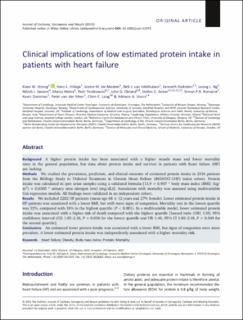Clinical implications of low estimated protein intake in patients with heart failure
Streng, Koen W.; Hillege, Hans L.; ter Maaten, Jozine M.; van Veldhuisen, Dirk J.; Dickstein, Kenneth; Ng, Leong L.; Samani, Nilesh J.; Metra, Marco; Ponikowski, Piotr; Cleland, John G.; Anker, Stefan D.; Romaine, Simon P.R.; Damman, Kevin; van der Meer, Peter; Lang, Chim C.; Voors, Adriaan A.
Journal article, Peer reviewed
Published version

Åpne
Permanent lenke
https://hdl.handle.net/11250/2996514Utgivelsesdato
2022Metadata
Vis full innførselSamlinger
- Department of Clinical Science [2318]
- Registrations from Cristin [9791]
Sammendrag
Background: A higher protein intake has been associated with a higher muscle mass and lower mortality rates in the general population, but data about protein intake and survival in patients with heart failure (HF) are lacking.
Methods: We studied the prevalence, predictors, and clinical outcome of estimated protein intake in 2516 patients from the BIOlogy Study to TAilored Treatment in Chronic Heart Failure (BIOSTAT-CHF) index cohort. Protein intake was calculated in spot urine samples using a validated formula [13.9 + 0.907 * body mass index (BMI) (kg/m2) + 0.0305 * urinary urea nitrogen level (mg/dL)]. Association with mortality was assessed using multivariable Cox regression models. All findings were validated in an independent cohort.
Results: We included 2282 HF patients (mean age 68 ± 12 years and 27% female). Lower estimated protein intake in HF patients was associated with a lower BMI, but with more signs of congestion. Mortality rate in the lowest quartile was 32%, compared with 18% in the highest quartile (P < 0.001). In a multivariable model, lower estimated protein intake was associated with a higher risk of death compared with the highest quartile [hazard ratio (HR) 1.50; 95% confidence interval (CI) 1.03–2.18, P = 0.036 for the lowest quartile and HR 1.46; 95% CI 1.00–2.18, P = 0.049 for the second quartile].
Conclusions: An estimated lower protein intake was associated with a lower BMI, but signs of congestion were more prevalent. A lower estimated protein intake was independently associated with a higher mortality risk.
